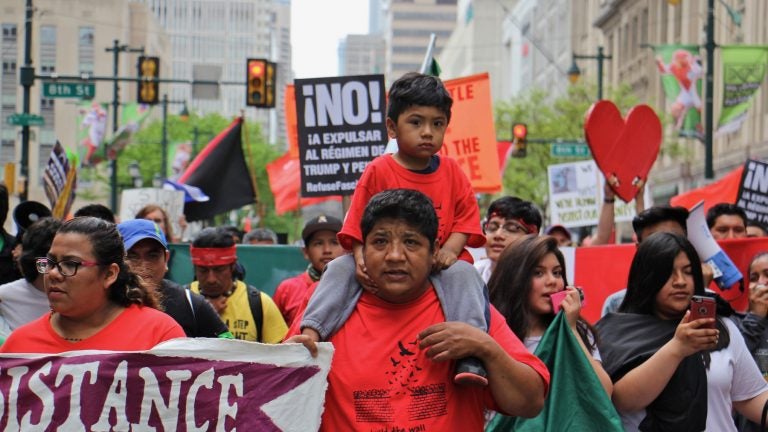Proposed U.S. change on evaluating green card, visa applications could impact Philly kids
The proposal calls for looking at use of food stamps, federal medical assistance and housing assistance when weighing an immigration application.

A large contingent of immigrants from Mexico and other Spansih-speaking countries participate in a May Day march in Philadelphia focused on President Donald Trump's immigration policies. (Emma Lee/WHYY)
This week, the federal government published a proposed policy change to the way it accounts for an immigrant’s use of public benefits when granting a visa or green card.
In Philadelphia, officials say the proposal to change the “public charge” would hurt the city’s tens of thousands of immigrant residents.
“Make no mistake about it, the administration’s main goal in making such a change is to discourage immigration, destabilize families by denying green cards to parents of U.S. citizen children … putting the well-being of millions at risk,” said Philadelphia Mayor Jim Kenney and Miriam Enriquez, executive director of the Office of Immigrant Affairs.
The proposal, published to the federal register Wednesday, calls for looking at use of SNAP benefits (what was once called food stamps), federal medical assistance and housing assistance when weighing an immigration application. Under current policy, cash assistance and long-term institutional care are already considered.
“Under longstanding federal law, those seeking to immigrate to the United States must show they can support themselves financially,” said Department of Homeland Security Secretary Kirstjen Nielsen last month.
While means-testing immigrants has a long history, critics of the proposal say it will radically expand the federal government’s ability to turn away legal immigrants.
“People even at middle-income levels will be subject to intense scrutiny,” said Maripat Pileggi, a staff attorney in the Public Benefits Unit of Community Legal Services of Philadelphia. Before, only those who depended on government aid for basic subsistence could be barred from the United States. Under the proposed rule, anyone making less than 250 percent of the federal poverty line could be kept out of the country, according to Pileggi.
The American Academy of Pediatrics has weighed in, calling the proposal “dangerous” for pitting immigrants immediate health needs against other goals. For example, a parent of U.S. citizen child might have to choose between seeking medical treatment and being able to stay in the country with their family.
“Imagine you’re a parent of a kid with diabetes or asthma,” said Dr. Katherine Yun, a pediatrician at the Children’s Hospital of Philadelphia. “You’re being asked to make this impossible choice.”
Health care providers and benefits counselors describe confusion and fear among their immigrant clients, even those who are exempt from public charge limitations, such as refugees and those seeking asylum. Alisa Jones, president of La Comunidad Hispana, a bilingual social services agency in Chester County, said her organization saw a 19 percent drop in the number of those seeking eligibility and enrollment services from January to August of this year. Yun described clients, without identifying them, who were weighing Medicaid coverage for prenatal care or for a child’s surgery in light of the proposal.
That chilling effect comes in spite of the reality that the policy, as of yet, has not changed and will not be retroactive.
“This is just a proposal, we don’t want families to panic,” said Yun, who also wrote an op-ed about the proposal for The Hill.
To help dispel confusion, the City of Philadelphia produced a fact sheet about the types of immigrants who are subject to public charge consideration.
A 60-day public comment window on the proposal closes in December.
WHYY is your source for fact-based, in-depth journalism and information. As a nonprofit organization, we rely on financial support from readers like you. Please give today.




